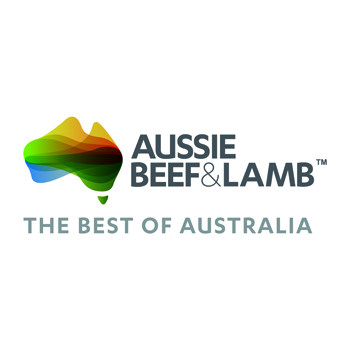The Blender of Choice for All Things Asian
You know the score. You’ve got a big batch of curry base or a large spice mix that needs a heavy dose of blending. The only problem is the blender you are using overheats and you must stop and start and never really know when you are close to pushing your blender to the limit.
If that rings true for you, then you need to look at the well-rounded range of hand blenders from Swiss brand, Kisag. Swiss designed and manufactured, since 1945, their handheld blenders have a two-speed motor capable of up to 20,000 revs per minute and an 8-minute continuous run time. They come in three sizes for all recipe needs.
That’s a serious amount of punch but it doesn’t stop there. The blenders are designed to fit the hand allowing the palm to have a firm grip giving more dexterity when blending. Plus, the design also has the added benefit of not rolling off a worktop when setting down between uses.
The sealed shaft prevents liquid from entering the drive shaft. Thanks to their extremely strong stirring performance and multifunctional all-purpose blade they are ideal for Asian kitchens that have a lot of heavy-duty processing to be done.
However, they can also be used for mixing, pureeing, or whipping cream, mayonnaise, for grinding and chopping of nuts. Every unit comes complete with a wall mount to keep the blender to hand and an extra long cable for ease of access around the kitchen environment.
Kat Cooper, Project Director at Mitchell & Cooper says
“Here at Mitchell & Cooper Ltd. we have distributed many brands of stick blenders over the years and feel Kisag’s strong Swiss design and manufacturing roots have created a well-rounded stick blender offer, with the chef in mind. Key design attributes make these stand out products in design and function.”
Available exclusively through Mitchell & Cooper Ltd.
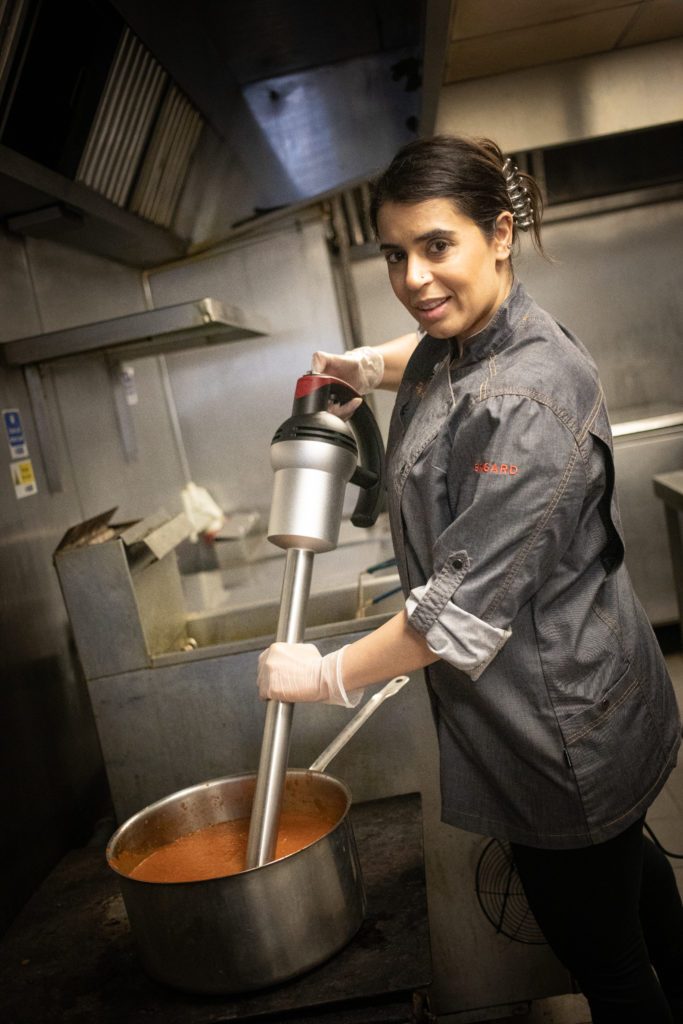
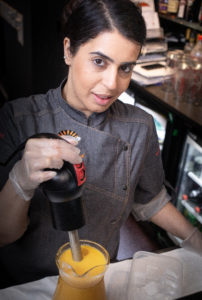
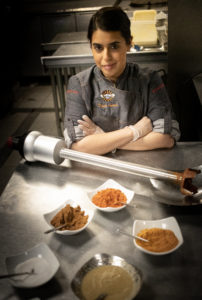
The Lobster Claw Band that Says Wales
As part of the new phase of the Banding and Branding project led by the Welsh seafood Cluster, Welsh lobsters now have branded Claw Bands, to make them stand out from their competitors, that makes them instantly recognisable by Chefs and Consumers alike, as a Welsh product.
The scheme, coordinated by The Wales Seafood Cluster, will enable chefs to identify Welsh lobsters by checking for the new, distinct, white bands that cover the claws, definitively showing that the shellfish has been caught in Welsh waters, and sustainably caught by Welsh fishermen.
The development of the new bands followed requests by a group of Welsh fishermen to develop the domestic market. Prior to the pandemic, approximately 90% of Welsh lobsters were exported, but now it is hoped that the domestic market can learn more about the properties of Welsh seafood, especially lobsters, increasing the demand for them across the UK.
Nia Griffith, North Wales Seafood Cluster Manager, Cywain, said:
“The Lobster Banding and Branding project is now in its second phase following the success of the pilot project during 2020. The branded #WelshSeafood bands are placed on the claws of lobsters caught in Welsh waters by Welsh vessels, destined for the UK Domestic market. By using the #WelshSeafood hashtag, which consumers can follow on social media, they can also share their pictures and recipes and become a part of the story of Welsh Seafood.
By buying a branded Welsh lobster, consumers and chefs can be assured that the fishers who have caught the lobsters have done so sustainably. Each fisher within the project has pledged to re-introduce berried-hens (female lobsters that have eggs) into the sea to reproduce, and also to use escape hatches within their pots which allows any by-catch or lobsters below the legal landing size to be able to exit the pots.”
 Lobster fisherman Sion Williams, from Porth Colmon, added:
Lobster fisherman Sion Williams, from Porth Colmon, added:
“The idea was to be able to market Welsh lobster because we have started to sell more in the UK as opposed to the continent. We needed something that would say Welsh on the actual lobster and the claw band was the result.
“A lot goes into the harvesting of lobster along the Welsh coast on top of the generation-to-generation passing down of knowledge. We fish daily on a small scale and are very sustainable. We promote grading of the catch and provide escape gaps to all fishermen so that smaller lobsters can escape. We want to make all lobsters caught under a certain size illegal so that we can actually promote this sustainability.
 Chef Ellis Barrie of Anglesey restaurant Marram Grass, said:
Chef Ellis Barrie of Anglesey restaurant Marram Grass, said:
“For me Welsh lobster is the best in the world. I couldn’t tell you whether that’s because of the water, the temperature, the fishermen or the way it is handled but I do know that almost all of the catch used to go abroad and was much prized.
“So, to be able to get premium Welsh lobster in a new way that promotes its authenticity, like line-caught sea bass, will go a long way to helping Welsh fishermen promote what they have been doing for generations. Not only does the new claw band promote Welsh seafood but it also indicates superior quality.”

Have You Ever Wanted to Work for Yourself?
Restaurants shut, kitchens closed, locked down. The pandemic hit hospitality hard and gave chefs an opportunity for reflection. The long hours, the hard slog, the difficult conditions. If that was you and you’re thinking of taking the plunge into self-employment then there are a number of options waiting for you.
 One of the most interesting is setting yourself up as a subscription service. To do this you can use a new tool called Subkit. This is an online service that enables you, the chef, to begin a business by subscription. So you can write, video, teach, send food parcels, recipes and more and the platform generates all the back-end and does the heavy lifting.
One of the most interesting is setting yourself up as a subscription service. To do this you can use a new tool called Subkit. This is an online service that enables you, the chef, to begin a business by subscription. So you can write, video, teach, send food parcels, recipes and more and the platform generates all the back-end and does the heavy lifting.
Subkit has everything you need, all in one place, to grow a food focussed business using subscriptions.
With Subkit, you’ll be able to:
- host subscriber-only articles, videos, and sessions
- receive and manage payments
- schedule and host events (virtual & IRL)
- build your very own subscription plan
- grow your audience
You’ll also have access to an in-house team of subscription experts, who can help you build the perfect subscription plan for you and your audience.
Want to offer your cooking expertise as a subscription to foodies and future potential master chefs? Subkit can help you build a subscription for that.
Want to offer regular recipes, video classes, and cookery courses? They can help you build a subscription for that. (And more!)
The best part, though? You keep 100% of what you earn. Subkit never takes a cut from your revenue.
Subkit offers you a suite of intuitive tools that can help you build and grow your business, including:
- professional looking profile
- email marketing (build, send, and use email segmentation to track and convert your potential customers)
- on-site blog with video on demand functionality and storage
- subscription plan building
- integrated calendar and booking functionality
- session-building (schedules events and classes that customers can book as part of their subscriptions)
- on-site payments, with Stripe integration
Beyond that the catering industry is filled with opportunity for those with a desire to work for themselves. Here’s a few examples:
Lockdown changed a lot of minds about ordering in restaurant food and buying goods and services online. Businesses like By Ruby and PEP Kitchen, both ready meal producers – one fresh, the other frozen – were both set up by ex-chefs. Both businesses are now up and running and successful but were founded on solid principles.
By Ruby was set up by two young chefs with experience in creating ready meals for affluent customers in Chelsea. They worked in a restaurant that had a ready meal offer. All they did was do it themselves.
 PEP Kitchen was created by two chef friends who had experience selling vegan and vegetarian street food. They took their best dishes and started selling frozen ready meals. It was a slow start but now they’re thriving.
PEP Kitchen was created by two chef friends who had experience selling vegan and vegetarian street food. They took their best dishes and started selling frozen ready meals. It was a slow start but now they’re thriving.
The point is discovering what you are good at, what your real knowledge is and what you can do easily that doesn’t not require a huge amount of risk and capital outlay.
If you want to open up on your own then take a look at the brilliant Normans Cafe in Tufnell Park. This is a greasy spoon done properly. It was set up in 2020 by chefs who wanted to do things their way. They now have a thriving business in a cheap premises and 12k followers on Instagram. They are well on their way to opening a second.

What we’re saying is that the traditional chef role is just that: traditional. But that doesn’t mean that you have to have that life. You can create ready meals, teach children, become an influencer, start a café, sell bread, make pasta, gelato and all sorts of other things. Or you could start an allotment and blog to go with it and turn yourself into a journalist.
The truth is that within you there is a creative force that needs to express itself. The secret is being honest enough to know what is you and what is you trying to do what someone else is doing better.
Look at chef Dan Cox. He had won The Roux Scholarship. He was a head chef for Simon Rogan. But he liked growing vegetables. So, in the end in, he packed it in and headed to the South West to run a farm. 10k followers on Instagram.
To find out more about how Subkit can help you and your culinary forward plans, visit www.subk.it/Chefs
Top Chefs Celebrate Wild Seafood From Alaska
 On a balmy summer’s day on Monday (14) June, top chefs gathered at West London College for a day of Covid-Secure menu development. The Alaska Seafood Marketing Institute are supporting UK chefs with an initiative that will provide promotional funding for restaurants that feature or are interested in featuring Alaska seafood on their menus.
On a balmy summer’s day on Monday (14) June, top chefs gathered at West London College for a day of Covid-Secure menu development. The Alaska Seafood Marketing Institute are supporting UK chefs with an initiative that will provide promotional funding for restaurants that feature or are interested in featuring Alaska seafood on their menus.
Seafood from Alaska is all wild and natural, being caught in some of the world’s most crystalline waters. Alaska’s sustainability credentials are second to none; fisheries are MSC and RFM certified and the taste of the various species is unmatched due to its rich environment and abundant food source where it is left to forage naturally.
During the day of menu development, four London chefs each took to the stove to create fantastic fish dishes to show off their individual cooking styles.
West London College hosted the day and lecturers were told all about the new Seafood University online courses available to catering students.
Chef Lecturer Bob Carruthers said
“This is just what my Level 2s need. The online courses look interesting and are totally free to access. It is great that our students will benefit from these recipe films and it will be great to recreate the recipes that the chefs cook today.”
Alicia, Northern Europe Marketing Executive said
“It is fantastic to be working with The Chefs’ Forum and some of London’s finest chefs to celebrate reopening of restaurants and showcase our support for the hospitality industry. After what has been a very difficult year, it is great to be able to work with culinary talent to develop new recipes and showcase the versatility of wild seafood from Alaska as well as offer support in the way of promotional funding to UK restaurants.”
Chefs taking part on the day were Masterchef: The Professionals finalist Philli Armitage-Mattin, TV Chef Dipna Anand, Ambassador of Taste For The Global Gastronomy Chef Chanaka Fernando and Creole Chef Patrice St Yves.
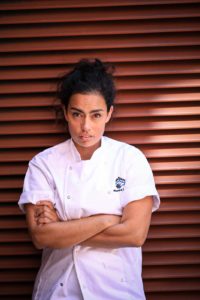 Philli was first to create her dish of Miso Alaska Black Cod with green shiso tempura, dashi sushi rice and saki marinaded eikura.
Philli was first to create her dish of Miso Alaska Black Cod with green shiso tempura, dashi sushi rice and saki marinaded eikura.
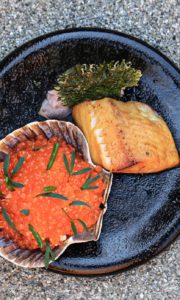 Philli loves to cook Asian food, having travelled across Japan taking in all the wonderful cooking styles, smells and flavours. Philli used her Konro BBQ grill to achieve a charcoal finish on the black cod.
Philli loves to cook Asian food, having travelled across Japan taking in all the wonderful cooking styles, smells and flavours. Philli used her Konro BBQ grill to achieve a charcoal finish on the black cod.
Philli said
“The inspiration for the dish came from my travels in Japan where I ate miso marinated cod on Hakuba mountain. I learnt to cook on a Konro grill in a restaurant in Hong Kong called Haku where I worked for three months. Black cod is has a lovely meaty texture and lends itself well to marination – It is great to know I can source this product and it comes beautifully portioned”
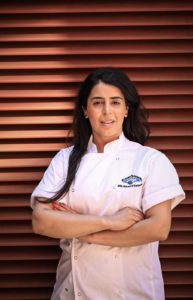 For restaurants seeking to switch to alternative species, wild Alaska pollock is the perfect substitute for cod and TV Chef, Dipna Anand showcased this versatility in creating a delicious masala fish dish.
For restaurants seeking to switch to alternative species, wild Alaska pollock is the perfect substitute for cod and TV Chef, Dipna Anand showcased this versatility in creating a delicious masala fish dish.
 Dipna added
Dipna added
“I absolutely love pollock, it really so versatile and excellent in a curry. Today’s masala dish is in my book, Beyond Brilliant and it is so great to be able to swap in Alaskan species.”
Species that are imported into the United Kingdom from Alaska include black cod, king crab, five types of wild salmon, wild Alaska pollock and yellowfin sole.
 Chanaka Fernando then created a fabulous Baked Alaskan King Crab Leg with Fennel, apple salad and crispy parsnips. Garnished with gold leaf, this beautiful dish really made a showboat out of this delicious and theatrical ingredient often used as a highly prized centrepiece by chefs across the globe.
Chanaka Fernando then created a fabulous Baked Alaskan King Crab Leg with Fennel, apple salad and crispy parsnips. Garnished with gold leaf, this beautiful dish really made a showboat out of this delicious and theatrical ingredient often used as a highly prized centrepiece by chefs across the globe.
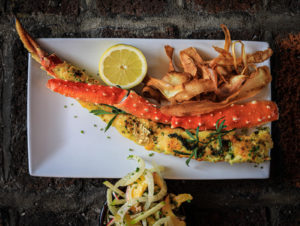 “I love to split the king crab legs open, add chilli, then bake them. Wild Alaskan king crab is one of my favourite species as the meat is always sweet and they really add the wow factor to any dish. King crab is also great simply steamed or sensational in a sushi roll. I am delighted to be working with Alicia and The Chefs’ Forum to promote delicious wild fish from Alaska.”
“I love to split the king crab legs open, add chilli, then bake them. Wild Alaskan king crab is one of my favourite species as the meat is always sweet and they really add the wow factor to any dish. King crab is also great simply steamed or sensational in a sushi roll. I am delighted to be working with Alicia and The Chefs’ Forum to promote delicious wild fish from Alaska.”
 Patrice St Yves was next up with his Creole-style dish of king crab Manioc Cannelloni Green Apple sabayon passion Moai caviar.
Patrice St Yves was next up with his Creole-style dish of king crab Manioc Cannelloni Green Apple sabayon passion Moai caviar.
“This dish is a celebration of the dual culinary heritages of South American and Guadeloupe. The ingredients connect the continent to the island. The manioc is ideal for king crab as it has a naturally delicate flavour.”
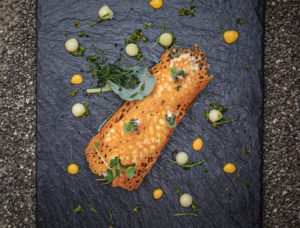 Alicia and the marketing team are inviting restaurants to request funding for marketing initiatives that boost sales of Alaska seafood menu items.
Alicia and the marketing team are inviting restaurants to request funding for marketing initiatives that boost sales of Alaska seafood menu items.
The Alaska Seafood Marketing Institute hope that by offering marketing funding to restaurants, we can encourage restaurants to include seafood from Alaska on their menus and help restaurants to sell more wild fish.
Chefs wishing to support the campaign and explore opportunities to showcase seafood from Alaska on their menus should email asmi@wearelotus.co.uk
It’s Time for Ice Green The Future of Ice Cream Machines by Nemox
Are You Ready for ‘ice green’ with the NEW Nemox Ice Cream Machine?
Did you know that churning ice cream can be bad for the environment?
Now the weather has finally started to break and industry back open, it is time to turn our attention to everybody’s favourite – Ice cream!
Mitchell & Cooper specialize in light catering equipment and are delighted to be able to offer a fantastic range of greener ice cream or gelato machines that are both environmentally more sound and kinder to budgets than competitor models.
The downside to this indulgent treat is that gases used in ice cream machines can contribute to the worsening effect of global warming. The historic gas of choice has been heavy on the hydroflourcarbon but recent breakthroughs in technology have seen a rise in propane gases and in the case of gelato machines – R290.
Research done by gelato machine maker Nemox, based in Italy, has resulted in the company changing its entire production line to remove hydroflourocarbons and replace it with R290.
However, this change has resulted in some extraordinary data – R290 can reach lower temperatures faster resulting in smaller crystals in the gelato at the same time using less energy which means lower electrical use.
So, if you are a chef looking at cutting edge gelato this is a real bonus. The new machines can chill gelato to previously unheard-of temperatures – around 1 degree lower. The result of this means that the gelato reaches that temperature faster than traditional methods and this is what results in the all-important smaller ice crystal.
Students of gelato will know that the best taste comes from small crystals as the result is smoother on the palate. This has normally been achieved by using more sugar. But the lower temperature of the new Nemox models means that gelato can be kept purer and less sweet and still achieve a smooth mouth feel.
And at the same time the process uses less energy meaning your kitchen is using less electricity which is more sustainable. This is something you can pass on to your customers as evidence of your responsibility and carbon footprint.
Michael Dutnall, Executive Chef at The RAF Club, Piccadilly is a real fan of the brand, he says
“I’ve had a Nemox for the past four years and wouldn’t be without it. It is small and compact, perfect for a space constrained kitchen and its tabletop positioning means that it can easily be moved around various sections in the kitchen. Our signature dish of chilled pea and ham soup with creme fresh sorbet features on the Club Menu in the dining room. This classic with a modern twist is always a hit with our discerning members. Our Nemox gelato machine certainly does what we need on a daily basis in terms of seasonal ice creams and sorbets – Great news that the brand is now making way for ice green!”
The new ‘ice green’ range, complete with new serving models, could revolutionise your menus and is perfect for enhancing recipes, both sweet and savoury.
To book a no obligation demonstration email Guy Cooper: G.Cooper@mitchellcooper.co.uk or shop the range here:https://www.mitchellcooper.co.uk/nemox/
Lifting the Lid on Can Opener Hygiene with Bonzer®
 Mitchell & Cooper are UK manufacturers of the iconic Bonzer® benchtop can opener.
Mitchell & Cooper are UK manufacturers of the iconic Bonzer® benchtop can opener.
Although the name Bonzer® is often applied generically to any tabletop can opener, authentic Bonzers® are distinguishable by the red knob on the handle. They have been in production since the 1940’s but the design is being constantly updated to meet the demands of contemporary catering.
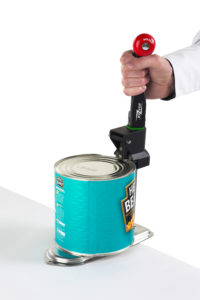 The most notable feature to be incorporated is the dishwasher friendly blade and cutting mechanism. The blades also have an anti-bacterial coating, perfect for maintaining hygiene standards in a busy professional kitchen.
The most notable feature to be incorporated is the dishwasher friendly blade and cutting mechanism. The blades also have an anti-bacterial coating, perfect for maintaining hygiene standards in a busy professional kitchen.
But what’s the message on hygiene we hear you ask?!
It’s a scene every head chef can identify with. The Environmental Health Officer is coming for an inspection and the whole team has been polishing the kitchen and cleaning under the ovens and behind the fridge. One piece of equipment the EHO’s will be sure to inspect is the benchtop can opener.
Now industry has finally reopened, it is important that we think about the inevitable visit from our friends in the white coats.
Kat Cooper, Project Director at Mitchell & Cooper said
“The Environmental Health Officers inspect benchtop can openers because it’s often one of the most common items that chefs don’t consider on a deep clean or for general maintenance. Chef’s need to be mindful of residue from multiple can openings in their daily routines and ensure the blades and wheels are looked after and replaced on a regular basis to ensure its functionality is not effected. All kitchens should make sure the benchtop Can openers are added to the routine cleaning and maintenance procedure. Each new model includes a quick start maintenance guide with tips and tricks to keeping your Bonzer up and running.”
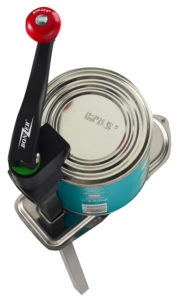 This uses a stainless-steel blade fitting and titanium coated blade that gives greater cutting power and durability. But the clever bit is a dishwasher-safe trigger mechanism and a quick-releasing, anti-bacterial blade.
This uses a stainless-steel blade fitting and titanium coated blade that gives greater cutting power and durability. But the clever bit is a dishwasher-safe trigger mechanism and a quick-releasing, anti-bacterial blade.
Now, the opener can be cleaned properly and kept hygienic, so you won’t get caught out at your next EHO visit.
Here are some top tips from Bonzer HQ:
- Ensure you select the correct product for your environment
- Register your product on purchase
- Open the tops of cans not the bottoms, store cans such as beans, upside down
- Open dented cans from just to the left of the dent
- Turn the handle clockwise – anticlockwise rotation could loosen the mechanism
- Never turn the handle continually without a can in place
- When replacing the can opener – change the base as well
- Never sharpen the blade – sharp blades cause sharp edges
- Replace chipped blades and wheel
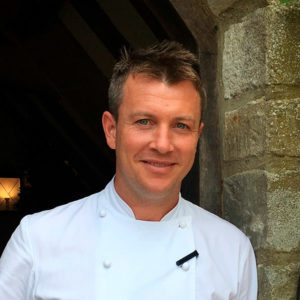 Richard Davies, Executive Chef at Calcot Hotel & Spa, Tetbury said
Richard Davies, Executive Chef at Calcot Hotel & Spa, Tetbury said
“My Bonzer can opener has been here at Calcot ever since I can remember, it’s probably older than me – They last a lifetime and are an integral part of the kitchen, and as such, should be maintained to the same standards as all other equipment – We certainly couldn’t do without it. There are other brands available, but none withstand the constant heavy usage that a Bonzer does – It really isn’t worth compromising on quality as you will finish up paying more in the long run, in terms of both down-time and money.”
To find out more on maintaining your Bonzer can opener click here for top tips by its family-run UK manufacturer Mitchell & Cooper.
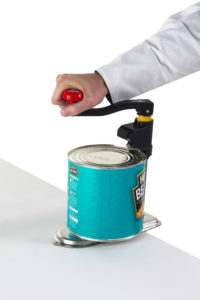 Register your Bonzer can opener here
Register your Bonzer can opener here
EZ20, EZ40, EZ60 TITAN models will benefit from an extended warranty for 5 years.
There is also a clear summary of the range and what environment each model is best suited for here to ensure you choose the right can opener for your individual kitchen set-up.
Show your Bonzer some love and follow these useful tips on maintenance to ensure your lids are lifted in the cleanest possible way and your Bonzer can opener kept in the best possible condition.
Electrox – The Acid Test of Hygiene; From Front to Back of House!
Meet hypochlorous acid, your new disinfectant best friend; Have you heard of a sterilising water before? Or fogging? Would you like a product that you can spray in your kitchen and front of house that stops Listeria and all viruses in their tracks and is not going to produce resistance?
If that is of interest to you then read on because an amazing new sterilising water from the company Electrox, is now available that kills 99.99% of viruses, bacteria, spores and fungi – fast. And the beautiful thing about it is that it is vegan friendly.
 Chris Vincent, Proprietor Orchardleigh Golf & Country Club says
Chris Vincent, Proprietor Orchardleigh Golf & Country Club says
“I have been using Electrox at my venue since last November. I chose it so that I could show my guests that I am going above and beyond to ensure that my premises are clean, sanitized and germ free. They can be safe in the knowledge that we take enhanced cleaning requirements seriously and are doing everything we can to give them peace of mind during their visit or stay.”
Electrox contains nothing of animal origin. Plus, it does not contain all the harsh chemicals that traditional disinfectants like bleach do. This makes it less damaging to the environment. It is a simple patented process that ionizes a salt and water mixture to produce the desired hypochlorous acid that is so effective against germs.
 Electrox can be administered using a fogger to spray minute amounts of sanitising water over large or small surfaces which make it a game-changer for disinfecting kitchens, dining rooms and public areas quickly and safely.
Electrox can be administered using a fogger to spray minute amounts of sanitising water over large or small surfaces which make it a game-changer for disinfecting kitchens, dining rooms and public areas quickly and safely.
Electrox fogging is a great tool for cleaning and housekeeping teams in hospitality as it minimized interruption to the business and readily reduces staff time in the need to regularly disinfect rooms and surfaces between each set of guests.
 John Pakulski, Head of Sales at Electrox said
John Pakulski, Head of Sales at Electrox said
“Electrox is a revolutionary tool for the hospitality industry as it prepares to reopen indoors from the 17th May. Electrox Sterilising Water’s active substance has been successfully tested for full viricidal activity against all viruses including coronaviruses and SARS-CoV-2. We are delighted to be working with The Chefs’ Forum to launch this highly useful and vital product to hospitality businesses as they prepare to fully reopen with the need for enhanced sanitization practices.”
How is it done?
Electrox is made by passing an electric current through a solution of water and sodium chloride (salt) using our unique, 4 chamber technology. This advanced, patented technology with its innovative production process creates Electrox – an incredibly effective disinfectant that contains hypochlorous acid.
When pubs, restaurants and hotels reopen for indoor trade on the 17th May, operators will have to ensure there is social distancing between groups and table service will be mandated. Wouldn’t it be great to be able to assist enhanced cleaning requirements with this revolutionary Electrox disinfectant range offering peace of mind to staff and guests.
 Why not enter our competition to WIN a F450 fogging machine and 25 litres of Electrox Water.
Why not enter our competition to WIN a F450 fogging machine and 25 litres of Electrox Water.
Simply like and share our social media pages on Twitter, Facebook and Instagram.
Terms and Conditions:
- The promoter is Electrox Water Ltd.
- The competition is open to residents of the United Kingdom aged 18 years or over except employees of Electrox Water Ltd and their close relatives and anyone otherwise connected with the organisation or judging of the competition.
- There is no entry fee and no purchase necessary to enter this competition.
- By entering this competition, an entrant is indicating his/her agreement to be bound by these terms and conditions.
- Only one entry will be accepted per person.
- Closing date for entry will be Friday 28th May 2021. After this date the no further entries to the competition will be permitted.
- No responsibility can be accepted for entries not received for whatever reason.
- The promoter reserves the right to cancel or amend the competition and these terms and conditions without notice in the event of a catastrophe, war, civil or military disturbance, act of God or any actual or anticipated breach of any applicable law or regulation or any other event outside of the promoter’s control. Any changes to the competition will be notified to entrants as soon as possible by the promoter.
- The promoter is not responsible for inaccurate prize details supplied to any entrant by any third party connected with this competition.
- The prize is as stated and no cash or other alternatives will be offered. The prize is not transferable. The Prize is subject to availability and we reserve the right to substitute any prize with another of equivalent value without giving notice.
- Winners will be chosen by an independent adjudicator or panel of judges appointed by the Promoter.
- The winner will be notified by telephone and/or email and/or DM on Twitter/Facebook and/or letter within 28 days of the closing date. If the winner cannot be contacted or do not claim the prize within 14 days of notification, we reserve the right to withdraw the prize from the winner and pick a replacement winner.
- The promoter will notify the winner when and where the prize can be redeemed.
- The promoter’s decision in respect of all matters to do with the competition will be final and no correspondence will be entered into.
- By entering this competition, an entrant is indicating his/her agreement to be bound by these terms and conditions.
- The competition and these terms and conditions will be governed by English law and any disputes will be subject to the exclusive jurisdiction of the courts of England.
- The winner agrees to the use of his/her name and image in any publicity material, as well as their entry. Any personal data relating to the winner or any other entrants will be used solely in accordance with current UK data protection legislation and will not be disclosed to a third party without the entrant’s prior consent.
- The winner’s name will be available 28 days after closing date by emailing the following address: alexandra@redcherry.uk.com
- Entry into the competition will be deemed as acceptance of these terms and conditions.
Chefs – Do you Know your Salt?
When it comes to food there is one ingredient that is inextricably linked: salt. It is so linked to food and life that common words in the English language owe their roots to salt. Two of these are salary and soldier. Salt was used to pay the wages of soldiers and others in ancient times.
However, more recently the image of salt has become about the effects of having too much in our diet and more about the dangers that poses.
In short what that means is that chefs need to be aware that lower salt dishes should be on the radar. This is not as easy as it might sound. The great Pierre Koffmann once said that the difference between a good chef and a great chef is a pinch of salt. Chefs are trained to taste their food and to adjust seasoning.
Readymade meals often contain high levels of salt to improve taste. Bar nuts were used to give drinkers a greater thirst, making them spend more on alcoholic beverages.
Salt and preservation in foods like bacon and smoked fish is integral to their identity. So, what to do?
One place to look is the origin of the salt you buy and cook with and one place we have discovered recently is in Pembrokeshire: The Pembrokeshire Sea Salt Company.
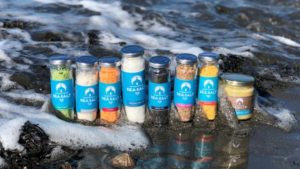 The business was set up in 2016 by Sherill Evans and Josh Wright who saw an opportunity to turn seawater into pure salt flakes. The way it always used to be done. It’s interesting that in ancient times armies would create their salt-drying areas before they went into battle so their food always contained enough goodness for the soldiers.
The business was set up in 2016 by Sherill Evans and Josh Wright who saw an opportunity to turn seawater into pure salt flakes. The way it always used to be done. It’s interesting that in ancient times armies would create their salt-drying areas before they went into battle so their food always contained enough goodness for the soldiers.
Salt has always been a critical component in food and remains so. The modern challenge is to harness salt’s goodness and use it for its health benefits in a way that is good for diners and doesn’t overload their daily intakes. This is especially relevant for chefs working in healthcare and public catering.
The key to finding a good salt is to look at its makeup. Industrial salt has been industrially heated at high temperatures to achieve its consistency and had added ingredients to stop it from caking and sticking together.
Sea salt is the opposite of this. It is sea water that has been dried slowly into pure white flakes or crystals – the old-fashioned way. This increases its mineral and health benefits and also brings with it the flavours and components of where it comes from. The sea water off the coast of Pembrokeshire is especially pure and makes marvelous salt.
Josh Wright, Director of Pembrokeshire Sea Salt says
“Chefs, if you give a flying fish about your flavours, don’t just add salt, add Pembrokeshire Sea Salt. Flavour and provenance mean everything to us, and to our customers too. Everyday we strive to make seasonings that are sustainably sourced, good looking and of course tasty! We also like to be a little bit different, so our range of sea salts is colourful, flavoursome, unique and inspired by nature.”
Pembrokeshire Sea Salt has recently sponsored a Hospitality Industry Taster Day set to take place on the 12th May for secondary school pupils thinking of choosing a course in hospitality and catering at Pembrokeshire College. Pinch pots of salt flakes and jars of salted caramel are being sent out to the schools taking part to add a 3D element to what would otherwise be a virtual event. The students will see top Welsh chefs cooking with the salt and will watch a film on salt production.
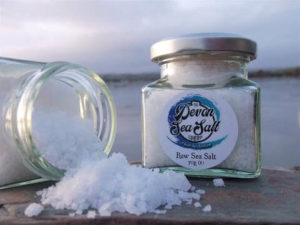 New kid on the (salt) block, Devon Sea Salt is another regional variety of naturally harvested sea salt from the Devon coast in the South West, launched just before Christmas in November 2020.
New kid on the (salt) block, Devon Sea Salt is another regional variety of naturally harvested sea salt from the Devon coast in the South West, launched just before Christmas in November 2020.
Their process of producing proper honest and sustainable sea salt is utilises traditional techniques with a hint of modern.
It is this approach which owners Chris and Anna-Marie Hambley believe gives Devon Sea Salt its character, appearance and punchy taste.
Chris says
“Our salt house uses no commercial boilers and no machines in fact no mass production methods at all, everything is carried out in the traditional way, by hand, by us and using just nature to produce our sea salt.,
Natural Sea salt production is a slow process and cannot be rushed. We can only harvest the salt crystals when they are ready and not before. It is the time we take over the whole process which makes sure that the salt we produce is enriched with the natural minerals from the sea water and this produces a superior taste and crystal structure.”
“Because of this process we do not need to add chemicals or anti clumping agents like many other salts available on the market, Our sea salt contains only what is found naturally in salt water and nothing else.
“All of our sea water is collected from the South Devon coastline and the salt is harvested within our small family run salt house overlooking the river Tamar. The process we use to produce our fresh crisp sea salt is always evolving to ensure we are as environmentally friendly as possible while retaining our true hand-harvested approach.”
Two great producers showcasing natural sea salt harvested from two very different areas or terroirs if we were to compare them to regional wine varieties – Hence the taste being completely different and Pembrokeshire majoring on flakes, while Devon sea salt sells crystals.
Both companies are constantly looking of ways in which to diversify into new product ranges and have many exciting plans afoot. The Chefs’ Forum will be following the progress of both producers and keeping you updated with all of the latest news on the salt front!
The New Standard for Ethical, Organic Vanilla?
Vanilla is traditionally bought from two main sources: Madagascar and Tahiti. But now a third centre of excellence has hit the market: Indonesia and in particular, Bali.
Meet Vanillaism, a new company set up by ex-private chef to the stars, David Buchanan, that sells eco-friendly and organic vanilla direct from the rainforests of Bali to a processing facility in Scotland.
The Chefs’ Forum met David when he kindly offered to supply vanilla to students participating in our Young Pastry Chef of the Year competition that launched this week.
David said
“It’s really important to support the next generation of chefs and we would be delighted to supply vanilla for the finalists to create their entremet visions. We will also be giving away samples to chefs in industry each month so they can appreciate first-hand the quality of our vanilla from rainforest to fork!”
David’s new website enables chefs and pastry cooks to buy high-grade vanilla in volume. Vanilla is expensive and Vanillaism is no exception but the story of how Buchanan worked with villagers and vanilla scouts to open up the trade route is interesting and compelling and it’s always nice to have a back story to an ingredient that appears on a menu. And that’s the real opportunity of Vanillaism: pure, organic, vanilla from Bali is a change to the usual Madagascar on menus giving chefs the opportunity to reintroduce vanilla as an exotic flavour with an eco-message.
Any chefs wishing to receive a free sample of vanilla should email: shop@vanillaism.com
Why Welsh Food & Drink Producers are the Envy of the World
Why Welsh food and drink producers are the envy of the world and how you can take advantage of food produced on your doorstep.
The Fine Food Cluster is an initiative by the Welsh Government’s Food & Drink Wales programme to produce and promote high quality products that make it easy for chefs to take advantage of stunning quality from across Wales.
The aim is to increase productivity, drive innovation and stimulate new business through networking and collaboration.
Amongst the members of the Fine Food Cluster are some of the best examples of what the Welsh food sector has to offer: Hand-reared, free range meat, cheese produced from a farmer-owned cooperative all the way to PDO-status sea-salt from the Menai Straits
A recent dish created by Lucknam Park’s Hywel Jones highlights everything that Wales has to offer.
 Hywel said
Hywel said
“Wales is home to some of the UK’s finest food and drink producers. What sets these men and women apart is the passion they have for their craft which is evident in the quality of their produce. As a Welsh chef I feel very fortunate and privileged to be able to showcase such outstanding produce in my cooking.”
Jayne Jones, Fine Food Cluster Manager told The Chefs’ Forum “The delicious dish that Hywel has created highlights the wealth and diversity of ingredients we have on our doorstep in Wales. Through working with The Chefs’ Forum we are able to connect Welsh producers with a network of top chefs ensuring that the food we grow and produce in this country gets showcased in Britain’s best restaurants.”
Take a look at Hywel’s recipe here.
What some of the producers say…
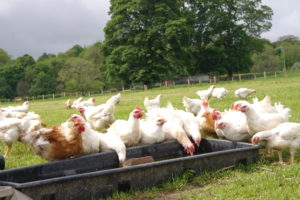 “Lord Newborough, Owner of Rhug Estate, said, “Rhug Estate has been supplying many of the top chefs in restaurants and hotels around the world since 2007 with organic lamb, salt marsh lamb, beef, chicken, and game reared on the estate. Top chefs recognise Rhug as a strong, well-recognised Michelin star brand, which offers unrivalled security of provenance.
“Lord Newborough, Owner of Rhug Estate, said, “Rhug Estate has been supplying many of the top chefs in restaurants and hotels around the world since 2007 with organic lamb, salt marsh lamb, beef, chicken, and game reared on the estate. Top chefs recognise Rhug as a strong, well-recognised Michelin star brand, which offers unrivalled security of provenance.
“The superior quality of Rhug’s products speak for themselves. Organic farming is all to do with adopting the highest standards of animal welfare and removing stress in the production cycle, this produces the highest quality meat.”
 Ruth Davies of Cwm Farm Charcuterie told The Chefs’ Forum
Ruth Davies of Cwm Farm Charcuterie told The Chefs’ Forum
“We’re really pleased that Hywel’s chosen our nduja to be include in his St David’s Day meal. We breed our own pigs on the farm and produce in our unit down the road on the outskirts of the Brecon Beacons. We’ve been fortunate to have worked with charcuterie masters in various countries over the years to hone our skills and we love putting our own Welsh twist on our produce. Last summer our laverbread salami won Gold at the Taste Olymp Awards in Athens putting Welsh charcuterie firmly on the map.”
For more information on the Welsh Fine Food Cluster and it’s producer members click here.
 “Subkit has helped me open up my cookery classes to a whole new audience from all over the world.”
“Subkit has helped me open up my cookery classes to a whole new audience from all over the world.”





